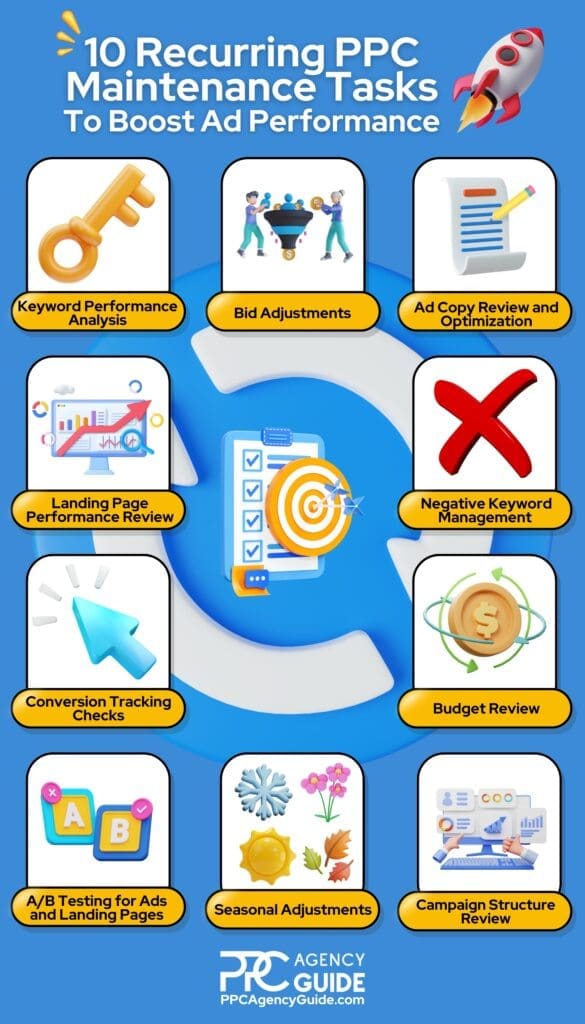
Nearly one in five pay-per-click (PPC) agencies spend at least five hours each week on PPC audit and maintenance, according to WordStream research. Clearly, professionals see serious value in fine-tuning ad campaigns. But where does this time go, and how do businesses benefit from ongoing PPC maintenance tasks? We’ll walk you through each task, how often it should be completed, the steps involved, and the benefits below.
Why PPC Maintenance is Vital to Campaign Success
Effective PPC management is about leveraging a variety of PPC tools and strategies to optimize performance and boost ROI. By continuously refining our PPC efforts and using data-driven insights, we ensure that every aspect of our campaigns contributes to successful PPC outcomes.
Before we break down the tasks you should be performing, let’s quickly review some of the reasons why performing PPC maintenance is vital to the success of your campaigns.
Digital Marketing Dynamics
The digital marketing strategy in today’s digital marketplace is incredibly fluid. Marketer and competitor strategies, consumer preferences, and market conditions can change rapidly. Regular monitoring ensures that your campaigns adapt to these changes, maintaining competitiveness, improve brand awareness and relevance.
Budget Management

PPC campaigns operate on a budget that is consumed each time an ad is clicked. Continuous oversight is needed to ensure that spending is optimized—that you’re not overspending on underperforming ads or underspending on ads that could generate more leads if given more resources.
Algorithm Updates
Search engines and social media platforms frequently update their algorithms. These updates can affect how ads are served and ranked. Staying on top of these changes can prevent your campaigns from underperforming.
Data-Driven Decisions
PPC management platforms provide a wealth of data on campaign performance. Analyzing this data helps you fine-tune ad copy, adjust bids, change targeting settings, and test new approaches. For instance, A/B testing different ad copies or landing pages can reveal more effective methods to engage potential customers.
Quality Score Optimization
Platforms like Google Ads assign each ad a quality score, which influences its cost and placement. By continuously optimizing ad relevance and landing page quality, advertisers can improve their quality scores, leading to lower costs per click and better ad positions.
Emerging Trends and Technology
Staying current with emerging trends, such as the use of AI in automated bidding or new ad formats, can provide competitive advantages.
10 Recurring PPC Maintenance Tasks to Boost Ad Performance
A business can expect to generate around $8 in profit for each $1 spent on Google Ads, the platform reports. However, some perform much better, often courtesy of their ongoing maintenance efforts.
1. Keyword Performance Analysis
Keyword performance analysis is a fundamental recurring task in PPC campaigns. This process involves regularly examining the effectiveness of the keywords you’ve bid on to determine which are driving traffic and leading to conversions and which are not performing as expected.
Frequency of Keyword Performance Analysis
This should be done at least monthly but more frequently for high-budget or dynamic campaigns.

Keyword Performance Analysis Process
- Review metrics like click-through rates (CTR), cost per click (CPC), conversion rate, and overall cost per acquisition (CPA) for each keyword.
- Identify underperforming keywords that may need lower bids or removal.
- Spot opportunities to add new, potentially profitable keywords based on emerging trends or search data.
Benefits of Keyword Performance Analysis
- Optimizes ad spend by reallocating budget to more effective keywords.
- Improves overall campaign performance and ROI.
- Keeps the campaign aligned with current search behaviors and market conditions.
2. Bid Adjustments
Bid adjustments are crucial for managing the cost-effectiveness of PPC campaigns. This task involves modifying your keyword bids to optimize for desired outcomes, whether that’s increasing visibility, maximizing clicks, or achieving a target cost-per-acquisition (CPA).
Frequency of Bid Adjustments
Like keyword performance, bid adjustments should be reviewed regularly, typically weekly or bi-weekly, depending on the campaign’s scale and budget.
Bid Adjustment Process
- Analyze current bid amounts in relation to the average position and performance of ads (e.g., CTR, conversions).
- Increase bids on keywords that are performing well but might be limited by budget caps or lower bid amounts.
- Decrease or pause bids on keywords that are underperforming or too costly relative to their returns.
Benefits of Bid Adjustments
- Ensures optimal spending on keywords that contribute most to campaign goals.
- It helps maintain or improve ad positions and visibility for competitive keywords.
- Adjusts spending dynamically in response to market competition and budget constraints.
3. Ad Copy Review and Optimization
Ad copy review and optimization is about periodically evaluating and refining the text and visuals used in your ads. This ensures that your messaging remains compelling and relevant to your target audience.
Frequency of Ad Copy Review and Optimization
Ideally, ad copy should be reviewed and tested every one to two months or more frequently if the campaign is highly competitive or if you are actively A/B testing.
Ad Copy Review and Optimization Process
- Assess the performance metrics of current ads, such as CTR and conversion rates.
- Identify any ads with lagging performance that might benefit from rewording, new calls to action, or visual updates.
- Leverage A/B testing to compare the effectiveness of different ad versions directly against each other.
Benefits of Ad Copy Review and Optimization
- Keeps messaging fresh and engaging for your audience.
- Optimizes ad performance by continually refining copy to appeal more effectively to target customers.
- Enhances the relevance of ads, which can improve quality scores and reduce costs per click.
4. Landing Page Performance Review
A landing page performance review involves examining the effectiveness of the web pages where visitors arrive after clicking your ads. This task is critical to ensure that landing pages convert traffic into leads or sales effectively.
Frequency of Landing Page Performance Reviews
Conduct reviews quarterly or more often if you’re running high-traffic campaigns or observing fluctuations in conversion rates.
Landing Page Performance Review Process
- Analyze key performance indicators such as bounce rate, average time on page, and conversion rate.
- Check for technical issues like slow load times or non-responsive elements that could hinder user experience.
- Implement A/B tests to compare different designs, content layouts, or calls to action to determine which variations perform best.
Benefits of Landing Page Performance Reviews
- Maximizes the effectiveness of the traffic generated by PPC ads.
- Improves the user experience, which can lead to higher conversion rates and better ad performance.
- Helps identify and rectify any disconnects between the ad content and landing page, ensuring consistency in messaging, which is crucial for maintaining user trust and interest.
5. Negative Keyword Management
Negative keyword management is the process of identifying and excluding irrelevant or non-converting search terms from triggering your ads. This task is essential to improve campaign relevance and reduce wasted ad spend.
Frequency of Negative Keyword Management
Negative keywords should be reviewed and updated monthly or more frequently in high-traffic campaigns where data accumulates quickly.
Negative Keyword Management Process
- Analyze search term reports to identify irrelevant queries that are triggering your ads.
- Add these terms to your negative keyword lists to prevent your ads from showing for those searches in the future.
- Continuously monitor and refine your negative keyword lists to adapt to new trends or changes in search behavior.
Benefits of Negative Keyword Management
- Decreases wasted expenditure by reducing the number of irrelevant clicks.
- Increases campaign efficiency by focusing your budget on keywords that are more likely to convert.
- Improves overall campaign performance metrics such as CTR and conversion rates by ensuring your ads are more targeted and relevant to the audience.
6. Conversion Tracking Checks
Conversion tracking checks involve verifying that the tools and codes used to monitor the actions visitors take on your website, such as purchases or sign-ups, are functioning correctly. This task is vital to measure the success of your PPC campaigns accurately.
Frequency of Conversion Tracking Checks
Regular checks should be performed monthly, or immediately after any updates to your website or tracking codes to ensure continuous accuracy.
Conversion Tracking Check Process
- Test and validate the tracking codes on your website to ensure they are firing correctly when conversions occur.
- Check the alignment between reported conversions in your PPC platform and your internal sales or leads data to spot any discrepancies.
- Resolve any issues with tracking codes, such as incorrect placements or outdated scripts, which can lead to inaccurate data.
Benefits of Conversion Tracking Checks
- Ensures accurate measurement of campaign effectiveness, allowing for precise ROI calculations.
- Helps identify and rectify issues quickly, preventing long-term data inaccuracies that could affect campaign optimization decisions.
- Provides reliable data for making informed adjustments to bidding strategies, ad copy, and targeting.
7. Budget Review
Budget review involves regularly assessing how your PPC campaign funds are allocated and spent across various ads and keywords. This task ensures that your advertising spend aligns with your strategic goals and delivers optimal results.
Frequency of Budget Reviews
Budget reviews should be conducted at least monthly, or more frequently in dynamic markets or during key business periods (like sales or product launches).
Budget Review Process
- Analyze expenditure trends to identify areas where the budget could be either optimized or needs adjustment.
- Reallocate the budget to high-performing campaigns or keywords to maximize ROI.
- Scale back or pause spending on underperforming elements to control costs.
- Ensure budget pacing is on track to fully utilize available funds without overspending.
Benefits of Budget Reviews
- Maximizes the effectiveness of each dollar spent by directing funds toward the most profitable areas.
- Prevents budget overruns and helps maintain financial control over marketing expenditures.
- Adapts quickly to market changes, allowing for responsive budgeting that matches business needs and opportunities.
8. A/B Testing for Ads and Landing Pages
A/B Testing for Ads and Landing Pages involves comparing two versions of an ad or landing page to determine which performs better in engagement and conversion rates. This task is crucial for continually refining campaign effectiveness.
Frequency of A/B Testing for Ads and Landing Pages
A/B testing should be conducted continuously throughout a campaign’s lifecycle, with each test running long enough to gather statistically significant data—often a few weeks, depending on traffic volume.
A/B Testing for Ads and Landing Pages Process
- Design two ad or landing page variants, differing in one key element such as the headline, image, or call to action.
- Split your audience to show each version to a similar group of users.
- Use PPC platform tools and web analytics to measure performance differences between the two versions based on predefined metrics like click-through rate (CTR) or conversion rate.
- Choose the more successful version for broader deployment and consider new tests for further optimization.
Benefits of A/B Testing for Ads and Landing Pages
- Optimizes campaign elements based on direct feedback from target audience interactions.
- Enhances conversion rates by iteratively refining the ad copy and landing page design.
- Provides data-driven insights into what resonates best with your audience, reducing guesswork in campaign management.
9. Seasonal Adjustments
Seasonal Adjustments involve modifying PPC campaigns to align with changes in consumer behavior that occur at different times of the year, such as holidays, special events, or seasonal industry trends. This task is crucial for capitalizing on fluctuations in demand and consumer interest.
Frequency of Seasonal Adjustments
Seasonal adjustments should be planned in advance of the relevant season or event, with campaigns updated several weeks to a month beforehand to significantly impact campaigns.
Seasonal Adjustment Process
- Identify key seasons and events relevant to your business and audience, such as back-to-school, holiday shopping seasons, or industry-specific peak times.
- Adjust your keyword strategies to include seasonal terms and phrases likely to be searched during these times.
- Modify ad copy and visuals to reflect seasonal themes or promotions.
- Reallocate the budget to push more funds into campaigns during high-opportunity periods to capture increased traffic and conversion potential.
Benefits of Seasonal Adjustments
- Enhances the relevance of your ads by aligning them with current consumer interests and activities.
- Boosts engagement and conversions by tapping into heightened buying intent during specific periods.
- Maximizes ROI by strategically increasing ad spend during peak times and scaling back during slower periods.
10. Campaign Structure Review
Campaign structure review involves evaluating and potentially reorganizing the setup of your PPC campaigns to improve manageability, relevance, and performance. This task helps ensure that your campaigns are structured in a way that enhances targeting and optimization efforts.
Frequency of Campaign Structure Reviews
A comprehensive review of campaign structures should be performed semi-annually or whenever significant shifts in marketing strategy or business objectives occur.
Campaign Structure Review Process
- Analyze the current organization of campaigns, ad groups, and keywords to assess clarity and logical grouping.
- Consider restructuring campaigns based on performance data, market trends, or changes in business goals.
- Streamline campaigns and ad groups to ensure each is focused and targets a specific audience or set of keywords.
- Implement changes to improve account manageability, targeting precision, and overall ad performance.
Benefits of Campaign Structure Reviews
- Increases the effectiveness of targeting by ensuring ads and keywords are well-matched and organized logically.
- Improves campaign performance through better allocation of budgets and more precise ad placements.
- Simplifies management and optimization of PPC campaigns, making it easier to make informed adjustments.
Get Help with Your PPC Maintenance Tasks
As you can see, there’s a lot involved in PPC maintenance tasks, but staying on top of them improves campaign performance and ensures you’re always getting the best results possible. If you’d like help managing your paid advertising, take the next step with a complimentary consultation.
PPC Maintenance Task FAQs
How often should I adjust the bids in my PPC campaigns?
Bids should be adjusted at least bi-weekly, though more frequent reviews may be necessary for dynamic markets or competitive industries to maintain optimal ad placement and cost efficiency.
What are the key components of effective ad copy for PPC ads?
Effective PPC ad copy should include a clear, compelling call to action, benefit-driven messaging that addresses the target audience’s needs, and relevant keywords to improve visibility and click-through rates.
Why is it important to regularly review landing page performance in PPC advertising?
Regularly reviewing landing page performance ensures that the page effectively converts ad traffic into leads or sales, provides a good user experience, and is aligned with the ad’s message.
How does negative keyword management improve PPC campaign efficiency?
Managing negative keywords helps prevent ads from showing on irrelevant searches, reducing wasted spend and increasing the relevance and efficiency of your campaigns.
What steps should I take to ensure my PPC conversion tracking is accurate?
Regularly test and validate tracking codes, align reported conversions with internal data, and troubleshoot any discrepancies to ensure data accuracy. If issues persist, consider consulting with a PPC agency for expert help.
How frequently should I review my PPC campaign budget?
PPC campaign budgets should be reviewed monthly to ensure spending aligns with business goals and market opportunities, adjusting as necessary to maximize campaign performance.
What is A/B testing in PPC, and how can it improve ad performance?
A/B testing in PPC involves comparing two versions of an advertisement or landing page to determine which performs better. This method helps optimize ad elements based on actual user responses, improving engagement and conversions.
How can I adjust my PPC campaigns for seasonal trends?
Adjust your campaigns by incorporating seasonal keywords, updating ad copy to reflect current events or seasons, and reallocating your budget to capitalize on increased demand during peak times.
Why is it important to periodically review the structure of my PPC campaigns?
Periodic reviews of your PPC campaign structure ensure that your campaigns remain organized, focused, and aligned with your strategic objectives, making them easier to manage and optimize.


















